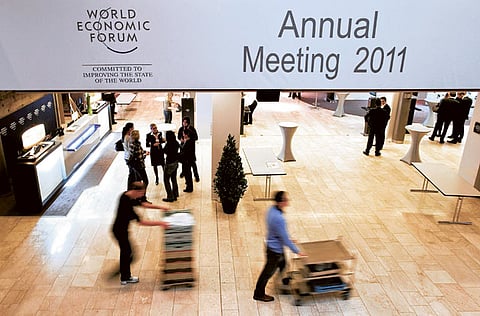Battle lines are drawn in Davos
One of the important discussion threads will be 'Supporting the G20 Agenda'

Davos: The battle between those who want to spend their way out of the recession and those who want to cut government deficits will dominate this year's World Economic Forum in Davos, Switzerland.
The desperate urgency of the past two years has dissipated, as the world has avoided the total crash that was threatened during 2009 as the impact of America's toxic assets spread through the financial institutions and triggered the recession that we are still living with today.
Vast government debts from their rescue packages are today's legacy, and governments such as Britain and Germany have made reducing the government debt their key economic policy. Their challenge is to do this without triggering another round of recession and this is where they are in deep disagreement with France and the United States, where the governments are ready to carry the debt for longer while still spending to prime their economies.
One of the important discussion threads in Davos will be "Supporting the G20 Agenda", which the World Economic Forum defines as "the most promising institution to define a new governance and multinational leadership."
As ever the Forum wants business to be able to retain initiative and its ability to find new areas and create jobs, but it also comments that it is important that governments do not become too overwhelmed by internal issues and constraints to the detriment of exercising global leadership.
The core of the week's discussions will be to define a consensus that is able to reach outside the big economies of the G20 countries, and can be picked up by many other countries which also need to find economic recovery. This kind of globally inclusive message is where Davos does well at building acceptance.
Another significant theme for the week is a series of discussions on how to build a global risk response mechanism. This need was triggered by the almost disastrous way that the governments, banks and multi-national institutions all managed to miss the emerging financial crisis in 2008, when pre-emptive action could have avoided a large part of the recession which hit so badly in 2009.
The idea that has been around several meetings of the World Economic Forum, and particularly the Dubai meeting in November of the 70 Global Agenda Councils, has been to develop better cross-system awareness of potential risks.
In the inimitable language of the Forum, "in a global world, systemic risk and natural risks cannot be avoided, but we can do much better in terms of building both global and institutional capabilities around risk resilience, inclusive of risk awareness, preparedness, mitigation and response."
This sounds easy, but the Forum is right to point out that the multinational institutions developed at the end of the Second World War are not able to handle the modern world. Banks are managed at a national level, but carry international risks. No single country can run a unique economic policy in today's global world, but there are very few bodies to allow proper coordination and agreement of policy.
For example, during 2009 nobody was able to give a lead until Gordon Brown's Britain and Barack Obama's America led the drive to expand the G8 to the G20 and even that is not a formal body with international powers.
Note that the international debate on what to do about the emerging recession was not led by the United Nations or the World Bank, or even the regional bodies like the European Union (although it probably did the best of them all) or the Gulf Cooperation Council.
The question which Davos is trying to answer is how to solve the problem that there is no network, no global system and no global mechanism in place that can distill the best expertise and experience to serve all international stakeholders.



